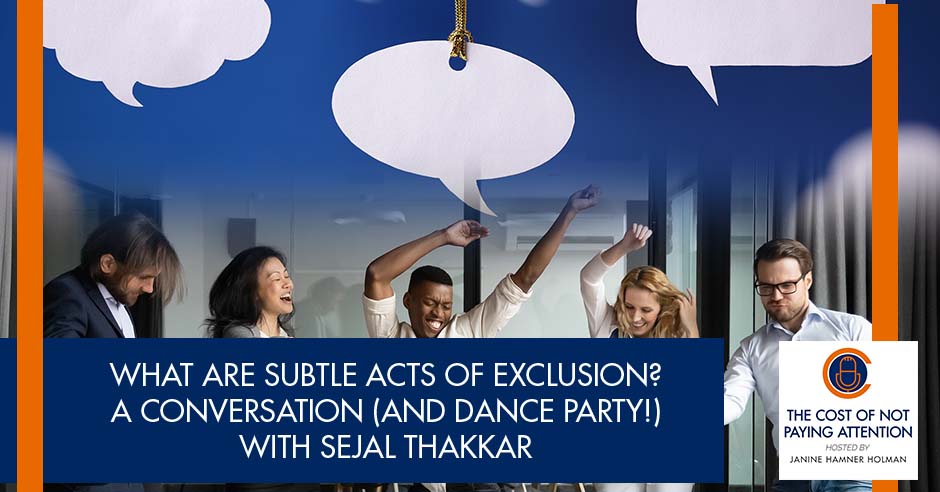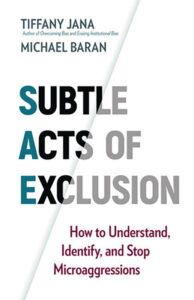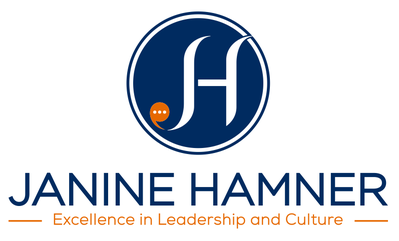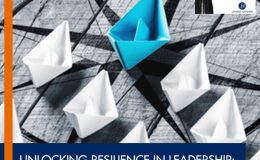
Remove the term microaggressions and call it “subtle acts of exclusion” instead. That’s what they are, and that needs to be dismantled. Learn how to deal with workplace diversity and properly call out someone who is being rude. Join Janine Hamner Holman as she has a conversation with Sejal Thakkar on the topic of microaggressions. Sejal is the Chief Civility Officer of TrainXtra and a part-time Chief Culture Officer of Nobody Studios. It is her mission to create a more accepting diverse world. Learn how to create spaces of inclusion. Discover the book Subtle Acts of Exclusion by Tiffany Jana and what you can learn from it. Start dismantling microaggressions today!
HOST: Janine Hamner Holman | Janine@JandJCG.com | LinkedIn, Facebook, Instagram, and Twitter |
—
Listen to the podcast here:
What are Subtle Acts of Exclusion? A Conversation (and Dance Party!) with Sejal Thakkar
Welcome to the show.
What am I paying attention to? The power of language and how often we forget to pay attention to that power. Language is formative. We create the world with our words. Every year, Webster’s or some other clever dictionary folk put out a list of new words that came into being in the last year. I’m always both tickled and often slightly dismayed by the words that we create.
I get to do a lot of work in a field that largely did not exist years ago around diversity, equity, and inclusion. Many organizations are now creating positions, Chief Diversity Officer, Chief of Inclusion, and Chief Heart Officer. Our guest for this episode is a Chief Civility Officer. I love that we feel empowered to create new positions in addition to new words as we learn, grow, develop, and lean into what it means to be human.
Today’s guest is Sejal Thakkar. She is a Chief Civility Officer. How great is that title? The way that she arrived to this position is beautiful. She began her employment career as an employment law attorney. She spent many years advising clients, talking about human resources and issues, talking with human resources personnel, and advising legal counsel about sound and standard employment practices.
Her work uncovered a need in the workplace but also a personal passion within her for bringing more proactive, relevant, and impactful training programs to the world of work. She founded TrainXtra. Her highly experiential customized workshops tailored to executives, managers, and individual contributors bring the courtroom to the training room in an interactive, engaging environment that favors human stories over compliance checklists. I am down with anything that is going to favor something over a checklist.
—
Welcome, Sejal.
Thank you so much for that warm welcome, Janine. I am looking forward to our conversation.
I’m going to begin the way that I usually do, which is by asking what is something that you have become aware of that people are not paying attention to, either intentionally or unintentionally, and what is the cost of that inattention?
I have had so many different ideas of what I wanted to talk about, but I landed on this one. The world has changed a lot in the last couple of years and our current climate is one where I feel like people are having a difficult time talking about sensitive issues or topics. People are not having the necessary conversations about certain things. One of those is microaggression. This includes conversations about what that term means and how we dismantle microaggressions from happening.

Subtle Acts of Exclusion: Microaggressions are offensive behaviors that make marginalized groups feel excluded. This could be because of their race, gender, religion, or disability.
We need to have more of those conversations if the goal is to create spaces for inclusion and respect for collaboration. We need to understand and address these interactions. I was prompted to have this conversation with you because I recently went on a walk with a friend of mine who is reading one of my books. I’m going to recommend this book to everybody during our conversation. I don’t call them microaggressions anymore. I call them subtle acts of exclusion based on this book.
While we werre walking, my friend used the word microaggression several times, so I said, “Before we continue the conversation, what does that mean to you?” He used the definition of rude behavior that people experience. Right there, I knew exactly what I wanted to talk about with him. Here you are reading a book about it and you still don’t understand it. We need to talk about this, Janine, and get it out there.
Microaggression is a word that did not exist a few years ago. I think of that word in a context that might include something that somebody is doing intentionally or unintentionally, but the outcome is that a person is left feeling less than. That is my working definition of it, but I have done zero research around this word. Help me out, Sejal.
The term microaggressions originated in the ‘70s by the Harvard Psychiatrist Chester Pierce. When it first originated, the term was talking about subtle behaviors that happen towards people: slights, insults, and offensive behaviors that someone makse towards a Black person or African-Americans. That is how the term originated and that ended up making them feel excluded because of their race. That is how the term started, and then the term slowly, over the years, has expanded to include all marginalized groups including race, gender, LGBTQ, religion, and disability. It is any marginalized group dealing with these subtle everyday acts of exclusion.
I recommend Subtle Acts of Exclusion: How to Understand, Identify, and Stop Microaggressions by Tiffany Jana and Michael Baran to anybody who wants to learn more. I have read a lot of books on this topic and this is the one that I am using in some of the work that I’m doing. I like the way she calls it subtle acts of exclusion versus microaggressions because I’m all about vocabulary, and words matter. That was the perfect opening to our conversation. Sometimes, I have noticed in my training that when you say the word microaggressions, it automatically creates defensiveness and people may think or say, “I’m a good person.”
By calling it subtle acts of exclusion, it is acknowledging that these things are happening without your conscious awareness. They are tricky, challenging situations that are hard to navigate. It is not necessarily your fault nor your intention. It is that we inherited a society that is full of racism and sexism for all kinds of folks. We have grown up in this situation. Our systems, our processes, and our policies are ingrained with certain biases that we have inherited.
We are saying and doing things to our marginalized groups that we may not even realize are harmful because our intention is not bad, but the conversation is about its impact on people. Unless you belong to that marginalized group, a lot of times, you won’t even understand why that is harmful because you have not gone through that lived experience. We can talk about a couple of examples of how you might look at it and say, “That actually is a compliment. It sounds like they are complimenting that person.” Then you ask that person and their response is, “That is not a compliment. That makes me feel like I don’t belong here again.”
If the goal is for us to be a more inclusive society and have more inclusive workplaces, we need to talk about this more and have these difficult conversations. I train and speak on this topic and sometimes someone asks me a question, and I respond, “I don’t know the answer to that. Let’s talk about that offline. Let’s work through that.” Every situation is different. There is no one right way of addressing it, but we all have to understand it so that we can do our part and help dismantle those.
If your goal is to create spaces for inclusion and collaboration, you need to start dismantling microaggressions. Share on XWhen we think about workplaces that are inclusive, organizations contact me and say, “I want to do something about this diversity thing.” My first question is, “Why?” Sometimes, the answer is some version of, “It feels like everybody is doing it. It seems like it is the right thing to do.” My least favorite is, “We were trying to get a contract and we have got to say that we are doing it.”
When they say that, it is usually that they are looking to check a box. They need to say to somebody, “We have done something on this.” The answer that I love is, “We are doing this in order to have our people be fully engaged, fully innovative, and to feel safe at work, so that they can bring up great ideas, so that they can be the most collaborative, innovative, and creative that they can possibly be. In order to reach the market that we are trying to reach, and to attract and retain the people that we want to retain, we have realized we need to be more inclusive.”
It is connected to who you are as an organization, what you are about, what you are building and creating. If you have a Chief Diversity, Equity and Inclusion Officer or a Chief of Inclusion, then often, they have the resources they need to do their jobs well. If you have hired those people, but you have not figured out why it actually matters to you, it is unlikely that those people are going to be successful. It is the reason that of all the C-suite positions have the highest turnover. If you are reading this and thinking, “Maybe I should be doing something about this in my organization,” I want to encourage you to step back and think about why. Why does it matter?
This is part of the growing pains. I had a conversation with the CEO where we were talking about training and they have not done a lot in the diversity inclusion area. They have done their anti-harassment training every couple of years, but they have not done anything. I asked him the question about why. Why was it that they had not done it? He said, “We do not have any issues here or any problems with that. We are primarily White or Caucasian.”
I looked at him and said, “That is great. It is wonderful that you don’t have any complaints. Number one, just because you haven’t received the complaint or somebody hasn’t filed a lawsuit against you yet doesn’t mean you don’t have a problem.” The other approach would be, “If you don’t have a problem, let’s be proactive, have these conversations now and make sure there are no problems.”
During the training that I was doing, somebody raised their hand. It was obvious that they felt they could not speak up in certain situations, and HR was not taking these complaints seriously, or that was my impression. At the end of the conversation, he said to me, “We should talk about that.”
I used to say, “Don’t wait until there is a problem. Be proactive about it.” You may have no diversity when you look around and you see everybody is White. That does not mean you do not have diversity. That is representational diversity. There is cognitive diversity. You might have different personality types. You might have different people who have different political views, so there is diversity on that. There are different kinds of what people like to do when they are not at work and what music they like. When you have people, whether they look the same is not the issue. That is why people get confused with the word diversity. Diversity means you have people who are different from themselves. Anytime you put different people together, it is going to create challenges. You have to work through those challenges.
What we are experiencing in this country is the growing pain of getting over the hurdle of saying, “We are not going to be just one way. We understand that it is better to have everybody who is already here be a part of this and who we are servicing.” Our customers are global now. If they are not, they should be. You should be striving for that. Now we are virtual and this global pandemic has changed the way that we do business.

Subtle Acts Of Exclusion: There’s an underlying message to microaggressions that are being sent to the receiver. It expresses a prejudiced attitude or belief towards that person. It has nothing to do with the intention of the person.
Unless you are going to continue working in your small area and not caring about what customers need, and maybe they don’t need your services or products, then you don’t have to care about diversity. How many companies are going to be able to say they fall into that small container? Look at me. I was traveling everywhere just like you doing this facilitation. I was training in India. I interact with people all over the globe and I think, “This is wonderful. I get to learn from other cultures and other countries and include these stories into the work that I’m doing.”
It is important to do this work and have these conversations no matter how uncomfortable they are. To move the needle in that direction, we all need to be doing this together. There is no way around it. I’m looking forward to breaking this down a little more, so people know what their roles are and what they should do, especially when dealing with microaggressions, which is huge.
Let’s get into that. Let’s start talking about what these are, how to recognize it if it comes out of your mouth or somebody else’s mouth directed at you. That is pretty easy to recognize at that point. What do we do about it?
As with everything else, the first step is awareness. The first step is understanding the definition of what microaggressions are, which is what I said earlier. It is everyday insults, slights, and the subtle behaviors that we do. The other point I want to make about this is we will call them offensive behaviors. They are excluding marginalized groups. They are not just your everyday rude interactions with each other. That is different. The psychological harm that results in these marginalized groups is significantly more because they are already feeling excluded or have a systemic history behind it, like racism. Look at the Asian hate that happened when COVID started, for example.
There is already harm that is happening to these marginalized groups. Why were they feeling excluded? They are dealing with these everyday slights and insults, so it is adding insult to the injury. It is constantly reminding them that, “I’m not from here. I do not belong here.” Like me, my parents are from India. I was born here, but people have said, “Go back to your country.” To which I say, “This is my country.” People also say “You look so exotic.” I just say, “Okay.”
This is where it gets tricky. Sometimes, it looks like a compliment, but there is an underlying message sent to the person receiving that or the subject that expresses a prejudiced attitude or belief towards that person. It has nothing to do with the intention of the person. Most of the time, Janine, these microaggressions or subtle acts of exclusion happen by well-intentioned people who are actually trying to be inclusive and connect, but they do not understand because they have not been in that other person’s shoes and have not gone through that journey.
That is why how we handle these conversations is different from how we might handle someone who is explicitly biased, racist, or hateful towards someone. This is a different conversation. That is why when I talk to people in my workshops about what do we do in these situations, I like to say we want to call that person in. We want to educate them. This is not about throwing that person under the bus, or any of that.
It is saying “I care enough about this relationship that I want to express to you. This is why it makes me feel the way it does.” It has to be about the awareness first, and then educating people and empowering people to have these conversations. If the organization’s response right away is, “Punt it over to HR and let HR handle it.”
Don't wait until there's a diversity problem. Be proactive about it. Share on XPlease don’t do that. HR has got enough on their plate. Unless it is sexual harassment or something that is going to violate your policy, we want people to be able to deal with these situations on their own. It is not happening consciously. It is happening unconsciously, so it is about educating. Every person in the interaction has a role to play there, so people have an idea of what that role is.
Let’ say that you and I don’t know each other and we are not friends and we are in a work interaction together. I’m still a woman because if I were a man, it might also get a little creepy. I don’t know you and I say to you, “Your name is interesting. I have never seen a name like that. You were so beautiful and exotic looking.” I am awkwardly trying to connect with you. I’m going to stop my part there. What might you say?
Let me add on a little scenario. One example we hear about a lot is that whole situation of, “That is an interesting name. Where are you from?” That is another one. I bring this up for a reason because then my response would be, “My name is Sejal and I’m from Chicago.” “Where are you really from?” That is why I don’t like using the word microaggression because people say, “What is the big deal about that?”
There is nothing micro about it because if I have to hear that every day, after a certain point, I will feel like I do not belong here or I’m not welcome here. The point is these don’t happen every one-off. They are happening every day. I was born here, so what difference does it make where my parents are from? It could be one thing if you are trying to get to know me, we are friends, and we have that relationship. It is not that we don’t want people to connect. We are saying we want you to connect, but be aware that it could have a harmful impact on somebody.
As far as to answer your question, what can we do about that? You were saying exotic. For most people, being called exotic might be a compliment, but because of the fact that I know that it is directed at me, oftentimes, because of my history and what I have gone through in my life, that leads me to me feeling like I don’t belong here. I was born here, but I don’t have white skin. You are subhuman. That is not what they are saying, but because I’m not light-skinned like you, I’m not a true American.
It is very important for people to understand that you may not even understand it. Even after I had this conversation with you, you might say, “What is she talking about?” The point is if we are going to have to continue working together, we have to eliminate the harm. It is not about your intention, but I have made it very clear to you.
Let’s say it was just me and you and there was nobody else. Every situation is different. I know you were friendly. I see you week to week, so I would feel comfortable saying, “Janine, when you say that I’m exotic, it makes me feel like I don’t belong here because I don’t look like you.” When I was younger, I was discriminated against. I have had people tape notes to my locker telling me to go back to my country. I can give you those examples and you will understand that most people will stop at that point. We are not trying to make people feel bad. It stops and then we are done. The point is that because I do this for a living, I’m choosing to share my story.
A lot of the psychological harm that people feel increases the stress in their lives lowers their emotional well-being. It causes depression and negative feelings like, “I don’t belong here. I have to work harder. I have to prove myself. I’m never going to be good.” It is Imposter syndrome and their physical well-being gets impacted as well. They call it fatigue. I don’t have the energy to have to tell everybody all day long that story. For Black people to do that, it constantly reminds them of all of the slavery and everything they have gone through.

Subtle Acts Of Exclusion: Canceling someone doesn’t solve the problem. All it does is make temporary noise.
For Native Americans, it is reminding them that we took their land. It is constantly re-enforcing that and most of us are trying to forget about that. It leads to fatigue in a lot of ways. It would be different if you, me, and somebody else were in the conversation in the room with us. In the book, they talk about words matter. In that situation, you would be the initiator. You made that comment, so you are initiating that comments. I’m the subject and the person that is there is called the observer. It is the observer’s responsibility to intervene.
Fo you to do that is going to depend on the situation. It is not about judging and making you feel bad. It is to make you aware of the comment for the behavior. That is it like, “Janine? Do you say that everyone is exotic?” It makes you stop and think, “Why did I ever use that word with anybody else?” Very much just make them aware of that behavior and to get that person to think, or if it is something worse.
If it is interrupting somebody during a meeting, you are interrupting the female, but you are not interrupting the male. If it is something like that, you might want to stop right then and there and say, “I would love to hear what you are saying, but Janine is making a very important point. I would like to have her finish.” Now it is letting that person know, “You just interrupted her. I value you and your opinion and I’m here. I got your back. I’m going to be an ally.”
In that situation, the observer has two choices. The observer can intervene like I said we should be doing, and we want to encourage everybody to do that. In that case, I’m an ally. I’m recognizing what is going on. In the case where I don’t do something, we call that person the bystander. They are just watching and they are not intervening. I’m not saying that in every situation, we intervene. There could be situations where you fear retaliation, so you don’t intervene right there. You could talk to the person afterwards or you get help. You contact or report it to somebody else who can deal with it, but something has to happen in that situation.
We can’t be silent and inaction is not going to help the problem. The person I was walking with gave me a scenario where he played hockey and was in some of these ice hockey rings. He hears a lot of locker-room conversation. He mentioned the conversation that he heard with, I’m not going to say what was involved, but he told me the situation. I’m like, “I don’t know what you would do in that situation.” These people could come after you where your health and your well-being could be in jeopardy. This is why it is important for companies to create psychological safety so that we can have these conversations and be able to talk to each other about these things.
You are bringing up so many different things. I want to pivot for just a second because we certainly have hundreds of folks who download each episode. We are now in eighteen countries which I’m super excited about. Some of the folks who listen to us may be solopreneurs and may have different jobs. They may be leaders in their organizations. They may not have yet decided to take up that mantle of leadership. I know you and I both believe leadership has nothing to do with a title. It has to do with the place that you decide to take and stand in your organization.
I want to take it out of the work context for a minute. I want to bring up an example that just happened to me. I was with a very good male friend who was Black, and we were watching a television program. These two Black women came on the show. These were both larger Black women. I’m a White woman who has struggled with my weight my whole life. These women came on and my friend said, “Those girls have been heiferized.” I said, “I’m sorry, what now?”
I reached over, I paused the TV, and I said, “What?” He said, “I told you about that conversation that I had with my coworker, who is also a Black woman.” This Black man that I was talking to had been talking to a Black woman and he had, in fact, told me about this conversation where she was recounting a situation with somebody, and she said, “I told her, heifer, I’m not going to do that.” I said, “I want to unpack this with you for a minute. I could be wrong because I’m a White woman, but my understanding of when Black women use that to each other, it is like me calling my best friend a bitch.”
When you connect with someone, be aware of what you say because it could have a harmful impact on somebody. Share on XShe can be a bitch. We can all be a bitch, but I love her. I would play tigers for her. In that context, it is a term of affection, and I said, “I think it is like that, other Black women calling other Black women a heifer. I don’t think it has anything to do with their physical body.” He said, “That is right.” I said, “When you just said that these women had been heiferized, what you were doing was comparing them to cows or large animals. You were saying, “Look at these fat women.” He was like, “No, because it is a thing in the Black culture and you don’t get it because you are White.”
I was like, “I completely disagree.” We ended up going around and around, and eventually, I was like, “Fuck it. Let’s just watch the program.” What think you, brilliant woman, about this? This is me as a White woman, theoretically, in a position of privilege and him as a Black man, theoretically, not in a position of privilege. I’m curious about your thoughts on all that.
It is ridiculous. I am completely with you there, and if you do, that is on you. You always risk, even if it is a friend. I have had some friends, the same friend, use that B word on me, then one of the times she used it, I was like, “I’m not.” Just because we are friends does not mean it is not going to be offensive to the other person. It is all about what is going on in that situation. First of all, you should not say that to anybody. Here is the thing, if it happens at work, it is a whole different scenario. At work, even if you and I don’t care and we call each other that all the time, we are doing it in public and somebody else walks by.
We are not talking to them and it is not even about that person. Now, they have file a complaint against us. We can’t turn around and say, “We are cool with it.” It is not acceptable and this is the problem. We have allowed things to go on. They have become a normal part of the culture and it should not be acceptable whether you are at work or you are not at work. The point is, at least at work, we can do something about it. That is why I focus my efforts on the work area because I want to change the entire world.
I will start small and then I will get there. Let me see if I can fix one problem. I got so much heat when the Black Lives Matter happened. I was out there and near activist status. I was speaking around about the stuff and somebody tried to call me out, and they said, “What you are doing isn’t solving the racism in this country.” I looked at him and I said, “I’m not saying that it is the solution for the entire problem of racism.”
As we all know, the entire problem of racism is massive. There are lots of things that are going to solve that problem and I do believe what I’m doing is one of those pieces, but I’m not saying that is the problem I’m trying to solve. I’m solving for stability. I want more stability in the world. My solutions are geared at that, which are going to also help solve the bigger problem that that person was trying to do. I was like, “There is plenty of room for all of us to be coming at this problem with our own of what we bring to this conversation.” In this episode, what we talked about is huge. We are saying talk to each other, let’s communicate, let’s get to know each other, let’s not make assumptions about each other and don’t call people certain things, no matter where you are at.
I want to go back a bit. You had made a distinction about calling people in as opposed to calling people out. Can you talk about that more, please?
The whole thing that I started hearing online about canceling people. Get with the program or you are canceled. You made some statement ten years ago when you were drunk at a bar and now, you will be fired from your job. It is out of control. It does not solve the problem. All he does is make some temporary noise then that situation goes away. You have wrecked some lives in the process and we are no better now than we were yesterday.

Subtle Acts Of Exclusion – https://www.penguinrandomhouse.com/books/617257/subtle-acts-of-exclusion-by-tiffany-jana-and-michael-baran/
Why don’t we focus on long-term solutions? People have to want to do this work. We can’t shove it down to anybody’s face. As much as I would to take a hammer and shove all this down, believe me, if I could, I would, but it requires us to make an intentional effort. Each of us has to choose for ourselves on how we convey our words, how we communicate, and what words we use, like me changing my vocabulary. I try not to use the word bias in my workshops, but I use the word belief. Instead of saying unconscious bias, I use unconscious belief because when people hear the word bias, they get, “I’m not biased. I’m not a bad person.”
There is a stigma associated with that word because of what the media has done. Same thing with microaggressions. I want everybody to pay very serious attention, but if I say microaggressions, people are going to tune out and sign out right then and there. I lost some people. I like the subtle acts of exclusion because we have all felt excluded at some point in our life. You are going to care about this conversation. We continue to do this work and not call people out. We call them in. We use these moments that are hard for everybody.
That is not saying that certain people don’t need to be penalized or punished or that policies don’t have to be followed. That is not what that is saying. That is not saying you are off the hook. All that is saying is that let’s assume that we all have positive intentions. Let’s try to approach this in a civil and respectful way where even if the person has some sort of prejudice because of what they have gone through. I talked about that in my TEDx talk. They are also a victim of their own upbringing, just like I was a victim of my upbringing.
They have got their story too. It is hard to see that when you are fighting each battle. I always encourage people to look at the bigger perspective, focus on the end goal, and then do their part in helping us get there. If we all did that, we would get there. We are getting there. I’m seeing stuff happen. I’m enjoying that I’m seeing some of that. Some people say, “We are never going to get there.”
That is what you are going to see more of, but if you just say, “We are getting there.” You can start having conversations with people, and things are going to start to happen, but we all need to do our part. Thank you for creating the space for me to be here to talk about some of these issues that you can see I’m obviously passionate about. Thank you for making me laugh. That was awesome. I love that.
You are welcome. Humor is one of the best ways when these conversations can get hard. They can get triggering and uncomfortable. The more that we can assume positive intent, which you just said, I want to underline that, have grace for ourselves and others, call people in instead of calling them out. These are some of the key elements in our opportunity as humans who are on this path of practice.
When we are learning something new, when we are practicing, sometimes we are not going to do so good, fuck up, and we are going to say the wrong things. I was assuming positive intent, which is why I paused the TV when he said that. I was like, “What?” I know he loves me and so, “Where are you coming from here, buddy?” If we assume positive intent and have some grace, remember to have some humor because it can all get hard if we remember that we are all practicing and that we are going for progress, not perfection.
Our community, the Wednesday group that we go to, is our support network. I try to schedule my week around that day, around that meeting where I have said, “I will do a training starting at 7:00 as long as we get done by this meeting.” I enjoy seeing everyone there and that community. Just get help. It does cause fatigue. I had to go off the grid for a week in December, where I was like, “I’m not checking LinkedIn because I’m tired.” Many people that are doing everything that you summarize so wonderfully, Janine, are doing that. Find those people. They are everywhere and be intentional about spending more time with those kinds of people.
Be an observer who can intervene, not a bystander. Share on XI was reading a book that was talking about women and money. One of the things that it was talking about was whatever it is that we are up to in the world. If it matters, we can’t do it by ourselves. We need to create a tribe, a group, a club, or a squad, however it works in our lives. We need to develop relationships with wonderful people that you enjoy, connect with, can be yourself with, and say, “I did this thing that I’m feeling crappy about. I said this thing. I’m struggling with this thing that happened where we can be honest, genuine, and show up as our true selves and then be seen.”
Did you see my LinkedIn post?
I did not.
This is a song I posted. I have said this to every person we talked about, but something about that conversation is. What you exactly just said is what this song is about. I’m going to imagine you dancing to this song. I want you to message me later and tell me if you started dancing. I have said this to three other people. I started off my day dancing with the chief of staff to the song. It wasn’t like I said, “Watch this song.” Something in the conversation was like, “This is me.” She said the same thing and I’m like, “Oh my God.” You are going to love this song.
I love this song so much, This Is Me, from The Greatest Showman. I have tingles on my legs from this. After the show is done, you and I are going to dance. This has been a joy and a delight. I have been trying to schedule this conversation for it feels like a year. I’m so glad we finally made it happen. Sejal, thank you so much for your brilliance, wisdom, friendship, and discernment. I so appreciate you.
Thank you for all of that.
Remember, great leaders, make great teams. Until next time.
Important Links:
- TrainXtra
- Subtle Acts of Exclusion: How To Understand, Identify, and Stop Microaggressions
- http://www.LinkedIn.com/in/SejalThakkar
About Sejal Thakkar
 Sejal Thakkar is founder and Chief Civility Officer of TrainXtra. As Sejal grew up in a suburb of Chicago, Sejal fought hatred and discrimination on a regular basis. She refused to allow ignorance, insensitivity, and the bullying conduct of others impact her inner “ninja”. Armed with knowledge she gained from these experiences, Sejal teaches that harassment will not stop on its own – it’s up to all of us to be part of the fight to stop workplace harassment. We cannot be complacent bystanders and expect our workplace cultures to change by themselves. Sejal passionately transforms the workplace and education settings into places of civility by empowering others to be a part of the solution. Her goal is to empower each employee to create a positive workplace environment
Sejal Thakkar is founder and Chief Civility Officer of TrainXtra. As Sejal grew up in a suburb of Chicago, Sejal fought hatred and discrimination on a regular basis. She refused to allow ignorance, insensitivity, and the bullying conduct of others impact her inner “ninja”. Armed with knowledge she gained from these experiences, Sejal teaches that harassment will not stop on its own – it’s up to all of us to be part of the fight to stop workplace harassment. We cannot be complacent bystanders and expect our workplace cultures to change by themselves. Sejal passionately transforms the workplace and education settings into places of civility by empowering others to be a part of the solution. Her goal is to empower each employee to create a positive workplace environment




